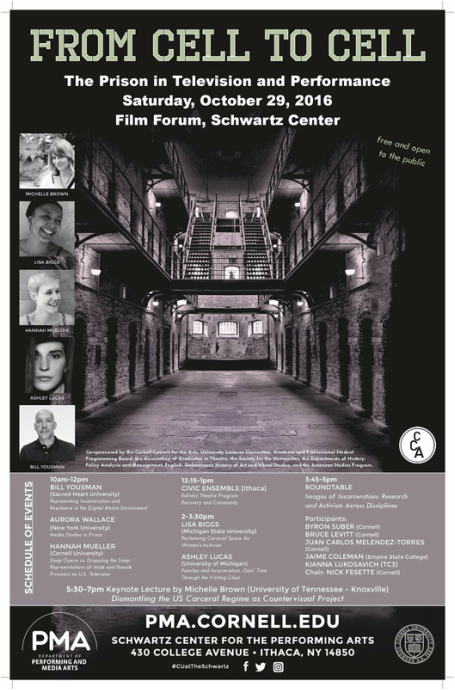
From Cell to Cell: The Prison in Television and Performance is a symposium that gathered scholars, artists, and activists to explore the intersections between theatre and performance-based prison work, especially in relation to different forms of activism, and televisual representations of incarceration. This free and public event began at 10:00 am in the Film Forum of the Schwartz Center for the Performing Arts on October 29, 2016, and was co-sponsored by the Department of Performing and Media Arts, the Cornell Council for the Arts, University Lectures Committee, Graduate and Professional Student Programming Board, the Association of Graduates in Theatre, the Society for the Humanities, the Departments of History, Policy Analysis and Management, English, Government, and the American Studies Program.
Coordinated by Cornell graduate students Nick Fesette (PMA), Kriszta Pozsonyi (PMA), and Hannah Mueller (German), this conference interrogated the stories, affects, and knowledges that pass from “cell to cell”: from the overcrowded cells that incarcerate 1 in 100 adults in the United States, to the media cells of the televisual projections of prisons across the world, to the individual cells of the body politic itself. In order to reckon with and transform the criminal justice system, it’s necessary to examine, critique, and perhaps undo the network of images and media representations of imprisonment; without changing the imagination, it’s impossible to change reality. Academics and performance-makers approach this project in a variety of ways, and this conference focused on two of them in particular: those who critique television’s role in circulating particular ideas of punitive justice and the experience of imprisonment, and those who cross the prison threshold in order to directly assist the incarcerated in using theatre and performance to incite transformation from the inside out. What are the different ways in which scholars and practitioners approach these processes? What might these socially-engaged rejoinders to mass incarceration gain by being examined in tandem? Other topics addressed included issues of race, class, gender, sexuality, and ability in incarceration; the role the arts play in rehabilitation and reentry; the history of prison in television and other media; and the role of art works generated by incarcerated people in the history of modern theatre.
Invited speakers included Bill Yousman, Assistant Professor of Communication and Media Arts at Sacred Heart University and author of Prime Time Prisons on U.S. Television: Representation of Incarceration; media studies scholar Aurora Wallace, professor of Media, Culture, and Communication at NYU; performance artist and scholar Lisa Biggs, Assistant Professor at Michigan State University; and Ashley Lucas, author of the play Doin’ Time: Through the Visiting Glass, Associate Professor of Theatre and Drama, and Director of the Prison Creative Arts Project at the University of Michigan. This event also featured a roundtable discussion of scholars and community members on criminal justice, incarceration, and representations of imprisonment, as well as a short performance of an original play by the members of Civic Ensemble’s ReEntry Theatre Program, an initiative started in 2015 to provide an opportunity for formerly incarcerated members of the Tompkins County community to participate in arts programming. From Cell to Cell culminated in a keynote lecture by Michelle Brown, Associate Professor of Sociology at the University of Tennessee and the author of The Culture of Punishment, among other works researching the culture, affect, and emotion in the lived life of carceral regimes.
Coordinated by Cornell graduate students Nick Fesette (PMA), Kriszta Pozsonyi (PMA), and Hannah Mueller (German), this conference interrogated the stories, affects, and knowledges that pass from “cell to cell”: from the overcrowded cells that incarcerate 1 in 100 adults in the United States, to the media cells of the televisual projections of prisons across the world, to the individual cells of the body politic itself. In order to reckon with and transform the criminal justice system, it’s necessary to examine, critique, and perhaps undo the network of images and media representations of imprisonment; without changing the imagination, it’s impossible to change reality. Academics and performance-makers approach this project in a variety of ways, and this conference focused on two of them in particular: those who critique television’s role in circulating particular ideas of punitive justice and the experience of imprisonment, and those who cross the prison threshold in order to directly assist the incarcerated in using theatre and performance to incite transformation from the inside out. What are the different ways in which scholars and practitioners approach these processes? What might these socially-engaged rejoinders to mass incarceration gain by being examined in tandem? Other topics addressed included issues of race, class, gender, sexuality, and ability in incarceration; the role the arts play in rehabilitation and reentry; the history of prison in television and other media; and the role of art works generated by incarcerated people in the history of modern theatre.
Invited speakers included Bill Yousman, Assistant Professor of Communication and Media Arts at Sacred Heart University and author of Prime Time Prisons on U.S. Television: Representation of Incarceration; media studies scholar Aurora Wallace, professor of Media, Culture, and Communication at NYU; performance artist and scholar Lisa Biggs, Assistant Professor at Michigan State University; and Ashley Lucas, author of the play Doin’ Time: Through the Visiting Glass, Associate Professor of Theatre and Drama, and Director of the Prison Creative Arts Project at the University of Michigan. This event also featured a roundtable discussion of scholars and community members on criminal justice, incarceration, and representations of imprisonment, as well as a short performance of an original play by the members of Civic Ensemble’s ReEntry Theatre Program, an initiative started in 2015 to provide an opportunity for formerly incarcerated members of the Tompkins County community to participate in arts programming. From Cell to Cell culminated in a keynote lecture by Michelle Brown, Associate Professor of Sociology at the University of Tennessee and the author of The Culture of Punishment, among other works researching the culture, affect, and emotion in the lived life of carceral regimes.
